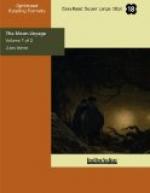“Will that be sufficient?” asked the major doubtfully.
“No,” answered the president, “certainly not.”
“Then what must be done?” resumed Elphinstone, looking puzzled.
“We must use another metal instead of cast-iron.”
“Brass?” suggested Morgan.
“No; that is too heavy too, and I have something better than that to propose.”
“What?” asked the major.
“Aluminium,” answered Barbicane.
“Aluminium!” cried all the three colleagues of the president.
“Certainly, my friends. You know that an illustrious French chemist, Henry St. Claire Deville, succeeded in 1854 in obtaining aluminium in a compact mass. This precious metal possesses the whiteness of silver, the indestructibility of gold, the tenacity of iron, the fusibility of copper, the lightness of glass; it is easily wrought, and is very widely distributed in nature, as aluminium forms the basis of most rocks; it is three times lighter than iron, and seems to have been created expressly to furnish us with the material for our projectile!”
“Hurrah for aluminium!” cried the secretary, always very noisy in his moments of enthusiasm.
“But, my dear president,” said the major, “is not aluminium quoted exceedingly high?”
“It was so,” answered Barbicane; “when first discovered a pound of aluminium cost 260 to 280 dollars; then it fell to twenty-seven dollars, and now it is worth nine dollars.”
“But nine dollars a pound,” replied the major, who did not easily give in; “that is still an enormous price.”
“Doubtless, my dear major; but not out of reach.”
“What will the projectile weigh, then?” asked Morgan.
“Here is the result of my calculations,” answered Barbicane. “A projectile of 108 inches in diameter and 12 inches thick would weigh, if it were made of cast-iron, 67,440 lbs.; cast in aluminium it would be reduced to 19,250 lbs.”
“Perfect!” cried Maston; “that suits our programme capitally.”
“Yes,” replied the major; “but do you not know that at nine dollars a pound the projectile would cost—”
“One hundred seventy-three thousand and fifty dollars. Yes, I know that; but fear nothing, my friends; money for our enterprise will not be wanting, I answer for that.”
“It will be showered upon us,” replied J.T. Maston.
“Well, what do you say to aluminium?” asked the president.
“Adopted,” answered the three members of the committee.
“As to the form of the projectile,” resumed Barbicane, “it is of little consequence, since, once the atmosphere cleared, it will find itself in empty space; I therefore propose a round ball, which will turn on itself, if it so pleases.”
Thus ended the first committee meeting. The question of the projectile was definitely resolved upon, and J.T. Maston was delighted with the idea of sending an aluminium bullet to the Selenites, “as it will give them no end of an idea of the inhabitants of the earth!”




